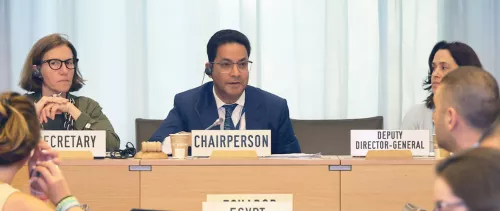
Participants in the negotiations on e-commerce discussed development-related proposals and data flow issues at their 27-30 March meetings. Members sought convergence on several topics, with a call from the co-convenors of the negotiations — Australia, Japan and Singapore —for more flexibility, creativity and leadership to help drive convergence and conclude negotiations by the end of 2023. The co-convenors also outlined principles underpinning the legal architecture for a future agreement on e-commerce.
An information session organized by the co-convenors focussed on development-related proposals that address implementation periods for developing countries and capacity building assistance. Members heard an update on capacity building efforts undertaken by the co-conveners.
To help deepen members' understanding of data flow, members heard presentations from the Organisation on Economic Cooperation and Development (OECD) and from private sector representatives on the importance of free flow of data and the role it plays in reducing cost, encouraging innovation and enabling digital trade. The presentations included examples from the Association of Southeast Asian Nations (ASEAN) region.
At a dedicated session on customs duties on electronic transmissions, the International Chamber of Commerce spoke about the benefits of doing business in an environment free of customs duties on electronic transmissions. A number of representatives of small businesses from Asia, Africa and Latin America shared their views on how customs duties on electronic transmissions can negatively affect their operations and undermine the predictably and stability that they currently enjoy.
Participants discussed the legal architecture envisaged for the future agreement on e-commerce based on guiding principles outlined by the co-convenors.
At another information session on e-payments, private sector representatives shared their experiences. A session on e-commerce and inclusivity provided participants with the opportunity to discuss a proposal on the role of e-commerce in making the benefits of trade available to all members of society, including indigenous people, women, rural communities and micro, small and medium sized enterprises.
Members continued to seek convergence on topics such as privacy, single windows, telecommunications, source code and cryptography.
Ambassador Hung Seng Tan of Singapore, chair of the 2023 plenary meetings, said: “We can only move as far as all of you, the participants, would allow the negotiations to move. We certainly count on each and every one of you in supporting the process, exercising flexibility and taking a pragmatic approach.”
Ambassador George Mina of Australia underscored the need for participants to demonstrate the leadership needed to drive the initiative towards convergence. He said: “We've been asked by ministers to conclude on the substance by the end of this year. So getting to the kind of convergence we need requires all of us to help with that effort.” He added: “Let's make sure that we are all trying to contribute to the convergence effort.”
In his closing remarks to the plenary meeting, Ambassador Kazuyuki Yamazaki of Japan underlined that provisions enabling and promoting the flow of data are key to a high standard and commercially meaningful outcome of the negotiations. He said: “We need to create a sense of commonalities that accommodates different circumstances of the members.” He added: “We have to be mindful of members' diversified interests and domestic regimes as well as the development aspects in order to achieve an inclusive outcome through the negotiations.”
Ambassador Yamazaki also stressed the importance of listening to the voices of developing members that are facing significant constraints in their capacities.


